General
Tanzanian PM Rt. Hon. Majaliwa Graces Islam@75 & MUMSA@50 Celebrations
Published
3 years agoon
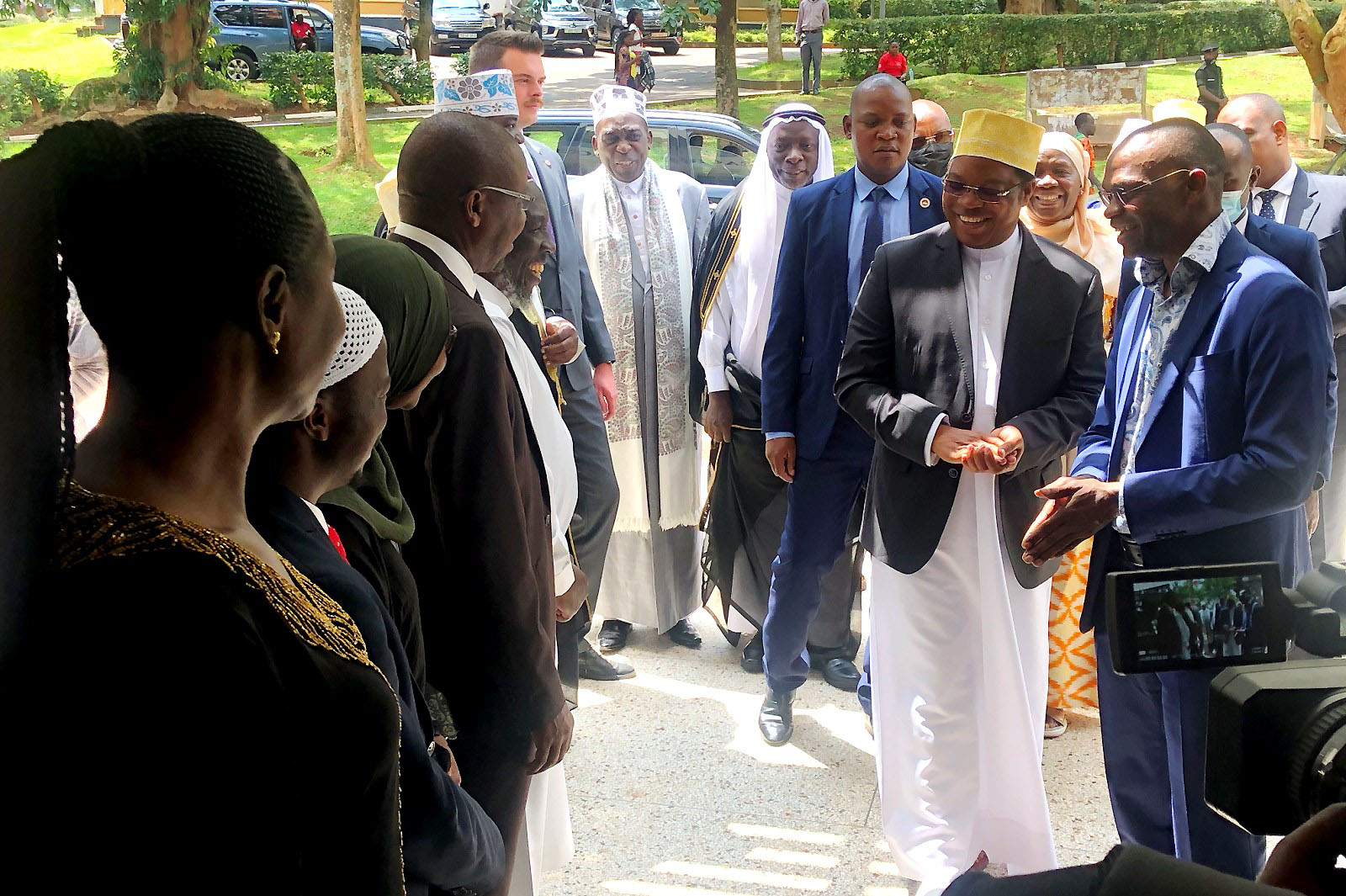
The clouds gathered as the clock struck midday, threatening to pour out their rain, perhaps to bless the day’s proceedings, as the Muslim community gathered on Saturday 17th December 2022 at the Main Campus to celebrate 75 years of Islam and 50 years of the Makerere University Muslim Students Association (MUMSA). Suddenly, and as if sensing that the dignitaries were about to arrive, the dark clouds cleared, giving way to a bright sunny afternoon. Right on cue, a grand motorcade gently made its way to the Frank Kalimuzo Central Teaching Facility, stopping right in front of the Main Entrance. Out he alighted, graceful, resplendent in his flowing white tunic to exchange Salaams with the welcoming party.
Rt. Hon. Kassim Majaliwa Majaliwa, Prime Minister of the United Republic of Tanzania and Chief Guest at the celebrations had arrived, accompanied by the Tanzania Chief Mufti – Sheikh Dr. Aboubakary Zubeiry, Zanzibar Grand Mufti Sheikh Saleh bin Omar Kaabi, Ministers, Tanzanian High Commissioner to Uganda – H.E. Dr. Aziz Ponary Mlima and other dignitaries. On hand to receive the Chief Guest were the Minister for Kampala Capital City and Metropolitan Affairs – Hon. Hajjat Minsa Kabanda, Acting Vice Chancellor and Deputy Vice Chancellor (Academic Affairs) – Prof. Umar Kakumba, Turkish Ambassador – H.E. Fikret Kerem Alp represented by his Deputy, Uganda Supreme Mufti – Sheikh Muhammad Shaban Galabuzi, Deputy Supreme Mufti – Sheikh Abdallah Semambo, Dean of Students – Mrs. Winifred Kabumbuli, Principal College of Humanities and Social Sciences (CHUSS) – Prof. Josephine Ahikire, University Imaam – Dr. Sowed Juma Mayanja, Patron MUMSA – Dr. Muhammad Kiggundu Musoke, Head Department of Journalism and Communication and Chairperson Makerere University Muslim Staff Association (MUMSTAF) – Dr. Aisha Sembatya Nakiwala and other officials.
Welcoming the Chief Guest, Prof. Kakumba conveyed the warm greetings of the Vice Chancellor, Prof. Barnabas Nawangwe who was away on official duty and thanked Rt. Hon. Majaliwa for leading the delegation to represent the President of the United Republic of Tanzania, H.E. Samia Suluhu Hassan at the esteemed occasion. “Makerere has grown by leaps and bounds from the good establishment and relationship it has enjoyed with the people and Government of the United Republic of Tanzania.”
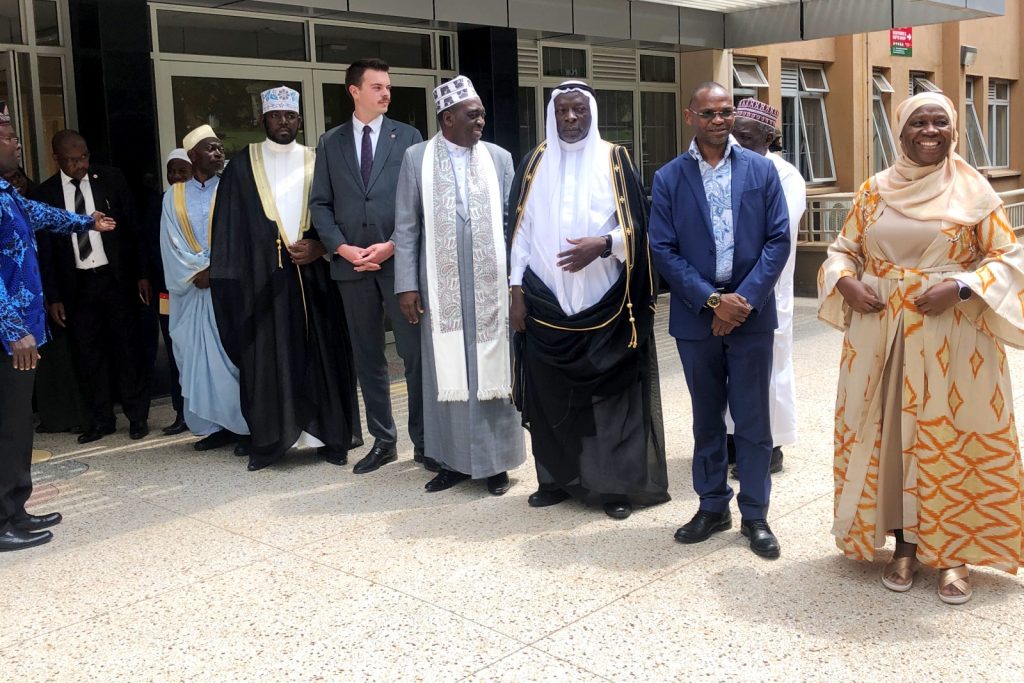
The Acting Vice Chancellor added that the University Mosque, officially opened in May 1948 by His Highness Crown Prince Abdulla of Zanzibar, is testimony of this good relationship that has existed between Makerere and the Sultan of Zanzibar.
Prof. Kakumba noted that the University Management nevertheless takes cognizance of the fact that Makerere is a secular university that highly respects and gives due consideration to the different religious affiliations and the freedom of worship. “It is the reason why the Management has been very supportive of the different sects of religion and creating opportunity for their growth and engagement of knowledge. For example, under the leadership of the Principal of the College of Humanities and Social Sciences, Makerere University hosts many centres of languages, among them the Centre for Arabic Language.”
He concluded by admitting that in addition to priding itself in a century of training Human Capital and leadership for the region such as Tanzania’s Founding Father H.E. Julius Kambarage Nyerere, Makerere University is privileged to host the Julius Nyerere Leadership Centre. He therefore requested the Rt. Hon. Prime Minister to convey the institution’s warm greetings to H.E. Suluhu Hassan, whose role as Head of State has inspired many young women particularly those of the Muslim faith to take on leadership roles.
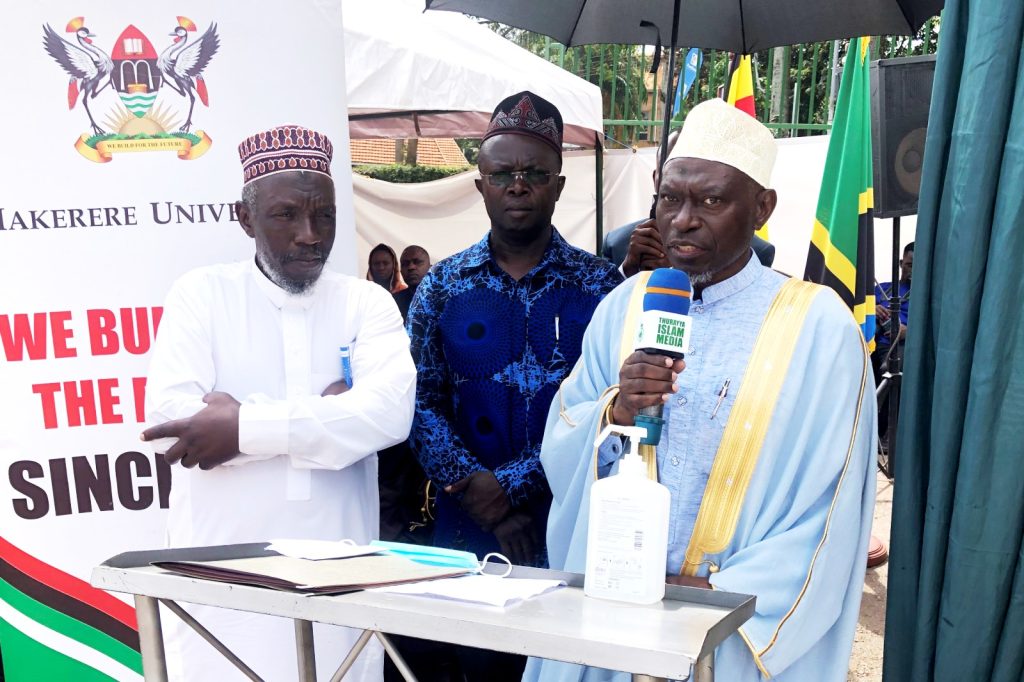
Congratulating Makerere upon celebrating 100 years of existence, Rt. Hon. Majaliwa Majaliwa recognized the University’s prestigious role in educating leaders for the region in general and H.E. Mwalimu Julius Nyerere and H.E. Benjamin Mkapa of Tanzania in particular.
“I also understand the relationship you have between Makerere and the University of Dar-es-Salaam and the programme of exchange of students. This is of course making the East African Community to be strong, and we expect to establish a lot of programmes that will develop our colleges” added the Rt. Hon. Prime Minister.
In the true spirit of the East African Community, Rt. Hon. Majaliwa Majaliwa delivered his congratulatory remarks in Kiswahili.
“I am happy to be here today because of two important reasons, one is we are celebrating 75 years of Islam and the second one, the Chief Guest today is going to deliver the speech through Kiswahili, which is the EAC language and AU language, so I will try to go slowly so that you don’t get lost” he counseled, much to the amusement of the majority English-speaking audience.
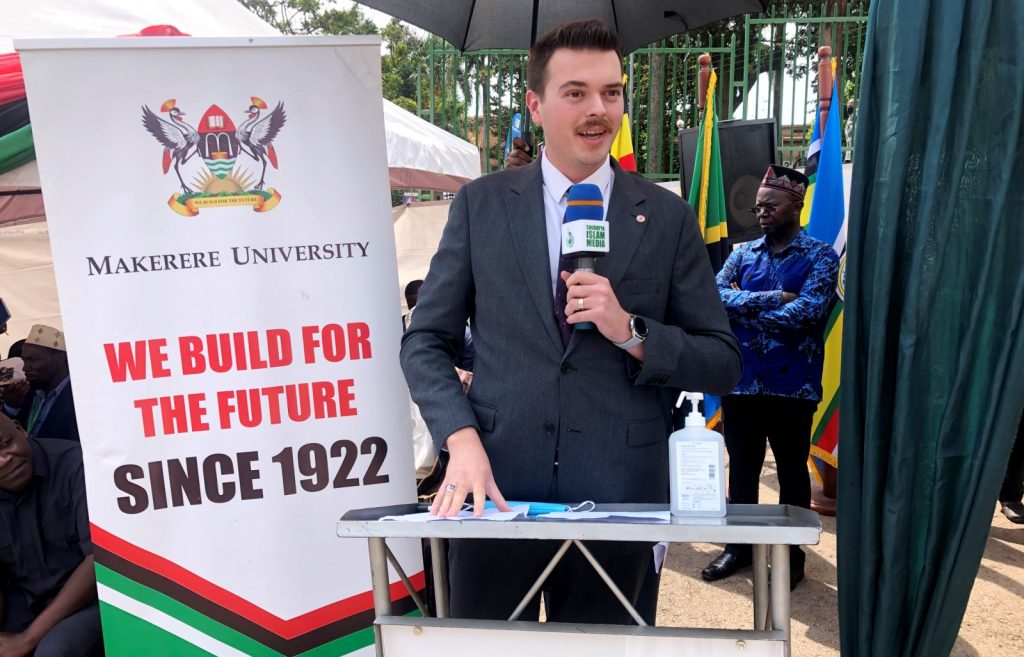
Prior to the Chief Guest’s address, the Deputy Turkish Ambassador in his remarks acknowledged that Makerere plays a vital role in developing human capital for the improvement of Uganda and the East African Community, “I think this country is lucky to have such a well-established and qualified university because education of new generations is the most essential part of development and stability of the country.”
He added that the Republic of Turkey seeks mutual gains and interests in its relationship with Uganda through humanitarian efforts that reach out to every corner of the country. “Currently, my Ambassador is in Lira, which is proof of our struggle to reach out to every corner of Uganda.”
Delivering a highly abridged version of his keynote address owing to the activity-packed programme, Prof. Abasi Kiyimba started by sharing that in 1997, Makerere was privileged to host both H.E. Benjamin Mkapa and H.E. Ali Hassan Mwinyi as the University, Islam and MUMSA celebrated 75, 50 and 25 years of existence respectively. He added that Makerere had benefited most from the Southern route through which Islam reached Buganda Kingdom from Zanzibar, in the form of teachers, scholars and the brand of Islam practiced. The other two routes through which Islam reached Uganda and Buganda Kingdom were the Eastern route through Mombasa and Northern route through Sudan.
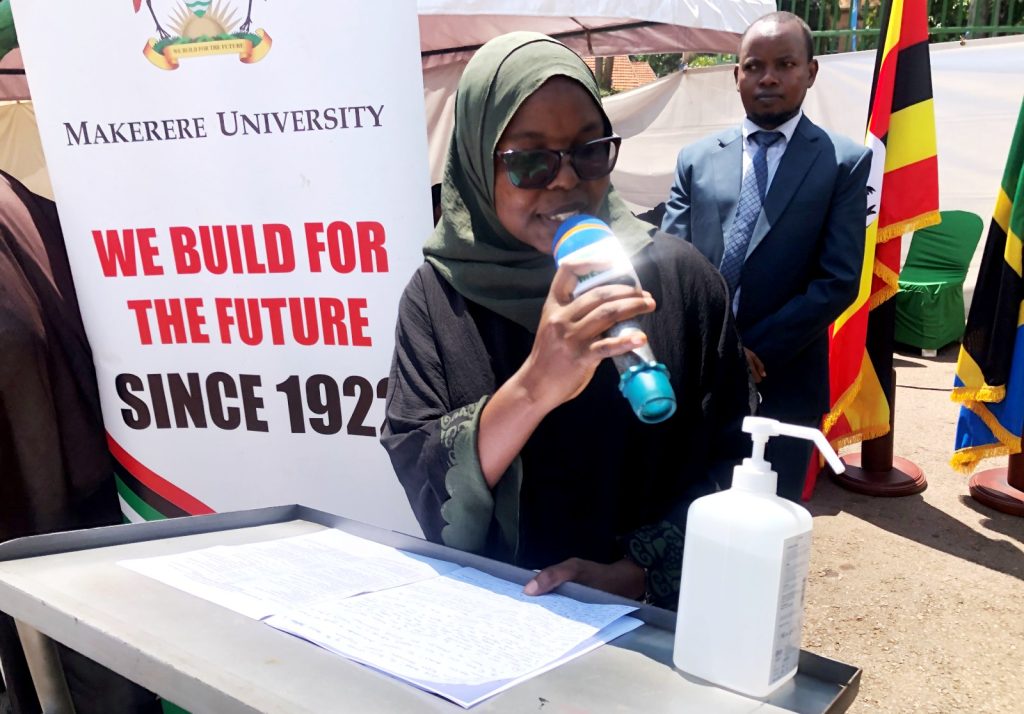
He added that the formation of MUMSA in 1972 was a significant development in the history of the Muslim Community, for it helped to formalize the Association’s membership and constitution as well as nurture leaders such as the founding Chairman Dr. Makumbi, now a retired Doctor in Kasese. Turning to the fundamental role played by the Sultanate of Zanzibar in donating the first University Mosque, Prof. Kiyimba said “we cherish very much our relationship with the Muslims and people of Zanzibar.”
The Chairperson MUMSTAF Dr. Aisha Nakiwala in her welcome remarks thanked the University Management for various infrastructure projects that have benefited the Muslim community, and support extended to Students’ activities. She thanked the Chief Guest for gracing the event and requested him communicate to H.E. Suluhu Hassan that her invitation to visit Makerere University and address the community still stands and remains highly anticipated particularly by the female Muslim Staff and Students.
The celebrations notwithstanding, when the call for prayer was made, the Chief Guest, visiting delegation and Muslim faithful put the day’s proceedings on hold and made their way to the University Mosque. The proceedings, ably moderated by Dr. Muhammad Kiggundu Musoke were graced by the past leadership of MUMSA, most notably Hon. Al Hajji Latif Ssebagala – Chairman MUMSA (1992-1994), whose energetic salaams to the faithful led smiles to break across their faces.
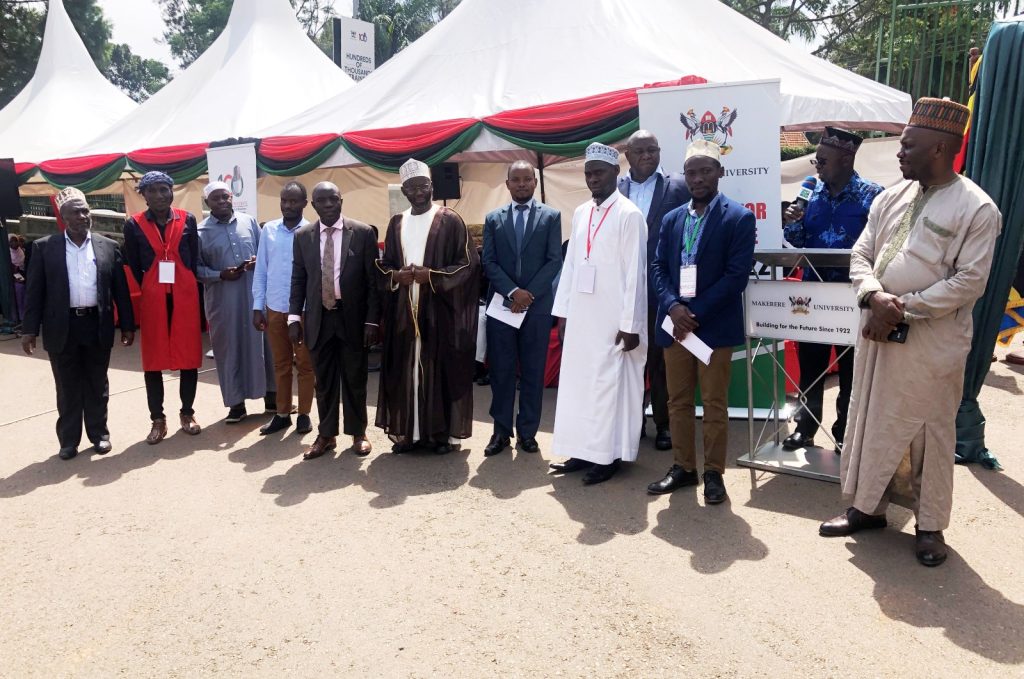
The current Chairman MUMSA Mr. Noordin Mutebi appealed to the gathering to support the association’s outreaches to less privileged communities in Uganda, by procuring a bus to help transport participants and eliminate one of the biggest recurring expenses. Responding to all the requests put forth, Rt. Hon. Majaliwa offered to update H.E. Suluhu Hassan on the invitation to visit Makerere. He equally pledged to contribute Six (6) Million Tanzanian Shillings to help various causes of the Muslim community and work together with the leadership to address the bus issue raised by the MUMSA Chairman.
You may like
-


Over 9,200 to graduate at Makerere University’s 76th Graduation
-


Meet Najjuka Whitney, The Girl Who Missed Law and Found Her Voice
-


Makerere University School of Public Health Graduates First Cohort of Cost-Effectiveness Analysis Short Course
-


Climate variability found to shape malaria trends in Yumbe District
-


Mak hosts First African Symposium on Natural Capital Accounting and Climate-Sensitive Macroeconomic Modelling
-


Uganda Martyrs Namugongo Students Turn Organic Waste into Soap in an Innovative School Project on Sustainable Waste Management
General
Over 9,200 to graduate at Makerere University’s 76th Graduation
Published
9 hours agoon
February 24, 2026
Pomp and colour defined the opening day of the Makerere University’s 76th Graduation Ceremony as thousands gathered to celebrate academic excellence and new beginnings.
The historic ceremony has brought together scholars, families, friends and industry partners in a vibrant celebration of achievement and possibility. Throughout the four-day event, the University will confer degrees and award diplomas to 9,295 graduands in recognition of their dedication and hard work.
Among the graduates, 213 will receive Doctor of Philosophy (PhD) degrees, 2,503 will graduate with Master’s degrees, and 6,343 will earn Bachelor’s degrees. In addition, 206 students will graduate with postgraduate diplomas, while 30 will be awarded undergraduate diplomas.
Of the total number of graduands, 4,262 are female and 5,033 are male. According to Vice Chancellor, this marks the first time in 15 years that male graduands have outnumbered their female counterparts.
The best overall graduand in the Sciences, Esther Ziribaggwa, graduated on the opening day with the Bachelor of Agricultural and Rural Innovation and an impressive Cumulative Grade Point Average (CGPA) of 4.77.

The ceremony marks a proud moment for Makerere University as it continues to nurture top-tier professionals across diverse fields.
While presiding over the graduation, the State Minister for Primary Education, Hon. Dr. Joyce Moriku Kaducu, on behalf of the First Lady and Minister of Education and Sports, Hon. Janet Kataaha Museveni, pointed out that Makerere University is a model institution, where leaders are nurtured, scholars are sharpened, and where dreams have been given direction.
In her address, Hon. Museveni, highlighted Government’s deliberate investment in research, innovation, and infrastructure to strengthen higher education in Uganda.
“The establishment of the Makerere University Research and Innovation Fund (RIF), supports high-impact research and innovation that directly contributes to national priorities and development. Through this initiative, thousands of researchers and innovators have pursued practical, scalable solutions that are transforming communities and key sectors across Uganda,” Mrs Museveni, said.
The Minister also noted that Parliament’s approved a USD 162 million concessional loan to upgrade science, technology, and innovation infrastructure at Makerere University. The funding will facilitate the construction of modern laboratories, smart classrooms, and state-of-the-art facilities for Engineering and Health Sciences, investments expected to position the University firmly within the Fourth Industrial Revolution.
“Government has embarked on the construction of a National Stadium at Makerere University and other institutions of higher learning across the country. This will promote physical education, strengthen talent identification, and boost investment in the sports sector,”

Turning to the graduands, the Minister encouraged them to see themselves not merely as job seekers, but as job creators and solution-makers.
Uganda and Africa need innovators who will modernize agriculture; engineers who will build quality infrastructure; healthcare professionals who will strengthen health systems; and educators who will inspire the next generation,” the Honourable Minister said.
She reminded graduates that they are entering a rapidly changing world shaped by Artificial Intelligence, climate change, and shifting global markets. To thrive, she advised them to remain adaptable, creative, and committed to lifelong learning.
She also encouraged graduates interested in entrepreneurship to tap into the Government’s Parish Development Model, which provides community-based financing and production support.
Quoting Proverbs 3:5–6, the Minister urged the graduates to trust in God as they embark on their next chapter.
She extended special appreciation to the Mastercard Foundation for its 13-year partnership with Makerere University in expanding access to education and empowering young people in Uganda and beyond.
In his speech, the Chancellor of Makerere University, Dr Crispus Kiyonga, urged graduands to harness research, innovation and technology to drive Uganda’s transformation.

“This is a milestone in your lives. You have invested time, discipline and hard work to attain these qualifications. It is important that you derive value from this achievement, not only for yourselves, but for your families and for society.” Dr Kiyonga, said.
Dr. Kiyonga expressed gratitude to the Government of Uganda for its continued financial support to the University, particularly the funding allocated under MakRIF, which he described as critical in strengthening the institution’s research capacity.
“Research plays a very vital role in the development of any community. Makerere as the oldest University in the country is doing a significant amount of research, However, more work is required to mobilize additional resources to further strengthen research at the University.” Dr Kiyonga, noted.
Acknowledging the challenges of a competitive job market, Dr. Kiyonga encouraged graduates to think beyond traditional employment pathways.
“It is true that the job market may not absorb all of you immediately. But the knowledge you have acquired is empowering. You can create work for yourselves, individually or in teams.” Dr Kiyonga, said.
He advised the graduands to embrace discipline, integrity and adaptability in the workplace, and to take advantage of technology and digital platforms to innovate and respond to societal challenges.
“Every development challenge presents an opportunity. Believe that you can apply your knowledge to create solutions with impact.” He said.
Addressing the congregation, the Vice Chancellor, Prof Barnabas Nawangwe, congratulated the graduands, particularly staff and societal leaders on their respective achievements.

“I congratulate all our graduands upon reaching this milestone. In a special way I congratulate the members of staff, Ministers, and Members of Parliament that are graduating today as well as children and spouses of members of staff,” Prof Nawangwe, said.
In his speech, Prof Nawangwe, recognized outstanding PhD students, particularly members of staff. who completed their PhDs in record time without even taking leave from their duties.
He called upon graduates not to despise humble beginnings but rather reflect on the immense opportunities around them and rise to the occasion as entrepreneurs.
“You are all graduating with disciplines that are needed by society. We have equipped you with the knowledge and skills that will make you employable or create your own businesses and employ others. Do not despair if you cannot find employment. Instead, reflect on the immense opportunities around you and rise to the occasion as an entrepreneur,” Prof Nawangwe, said.
Prof Nawangwe called upon the graduands of PhDs to use their degrees to transform the African continent.
“As you leave the gates of Makerere I urge you to put to good use the knowledge you have received from one of the best universities in the World to improve yourselves, your families, your communities, your Country and humanity. Let people see you and know that you are a Makerere alumnus because of the way you carry yourself in society with dignity and integrity. Put your trust in God and honour your parents and opportunities will be opened for you,” Prof Nawangwe, said.
Delivering a key note address, Prof. Nicholas Ozor, the Executive Director of the African Technology Policy Studies Network Nairobi, Kenya ((ATPS). Reminded the graduates that a degree is not a finish line but the beginning of accountability. “The world is a complex, fast changing and deeply unequal. Degrees make you responsible for others not better than them,” Prof Ozor, said.

The 76th Graduation Ceremony of Makerere University will be held from Tuesday 24th to Friday 27th February, 2026. A total of 213 PhDs (87 female, 126 male), 2,503 Masters (1,087 female, 1,416 male), 206 Postgraduate Diplomas (80 female, 126 male), 6,343 Undergraduate Degrees (2,999 female, 3,344 male), and 30 Undergraduate Diplomas (9 female, 21 male) will be graduating from all the Colleges.
Ms. Sarah Aloyo and Ms. Nakato Dorothy both students of the Bachelor of Procurement and Supply Chain Management emerged as the best in the Humanities and Best Overall students with a CGPA of 4.93. Mr. Ssewalu Abdul, a Bachelor of Leisure and Hospitality Management student emerged second best in the Humanities with a CGPA 4.90. Ms. Esther Ziribaggwa emerged as the best student in the Sciences with a CGPA of 4.77 in the Bachelor of Agricultural and Rural Innovation, while Mr. Simon Mungudit emerged second best in the Sciences with a CGPA of 4.76 in the Bachelor of Science in Petroleum Geoscience and Production.
Commencement Speakers
- Day 1 – Prof. Nicholas Ozor, the Executive Director of the African Technology Policy Studies Network, Nairobi, Kenya
- Day 2 – Prof. Dr. Maggie Kigozi, Chairperson Makerere University Endowment Fund Board
- Day 3 – Dr. Patricia Adongo Ojangole, Managing Director, Uganda Development Bank Limited
- Day 4 – Ms. Reeta Roy, Former President & Chief Executive Officer, Mastercard Foundation
The 76th Graduation Ceremony will be held at the Freedom Square following the schedule below:
Tuesday, 24th February, 2026
College of Agricultural and Environmental Sciences (CAES)
College of Computing and Information Sciences (CoCIS)
College of Education and External Studies (CEES)
School of Law (SoL)
Livestream Link for Day 1: https://youtube.com/live/wVGPA0FJ9pU
Wednesday, 25th February, 2026
College of Health Sciences (CHS)
College of Natural Sciences (CoNAS)
College of Veterinary Medicine, Animal Resources and Bio-security (CoVAB)
School of Public Health (SPH)
Thursday, 26th February, 2026
Makerere University Business School (MUBS)
College of Business and Management Sciences (CoBAMS)
Friday, 27th February, 2026
College of Engineering, Design, Art and Technology (CEDAT)
College of Humanities and Social Sciences (CHUSS)
Institute of Gender and Development Studies (IGDS)
Makerere Institute of Social Research (MISR)
General
Mak Selected to Host Alliance for African Partnership Africa Office
Published
2 days agoon
February 23, 2026
Makerere University has been selected to host the Africa Office of the Alliance for African Partnership (AAP). The significant milestone that underscores Makerere’s role in fostering research, innovation, and global collaborations across the continent was announced at a meeting of the University’s Central Management with an AAP delegation on 23rd February 2026.
Makerere’s selection was based on the University’s robust commitment, alignment with the AAP’s Strategic Plan, and proven ability to manage consortium activities. The AAP, which was initiated by Michigan State University (MSU) in collaboration with Ten African Universities and agricultural policy research networks in 2016, targets critical challenges in education, youth empowerment, health and nutrition, agri-food systems, science and technology, water, energy, environment, and culture and society.
Addressing the delegation consisting of AAP Co-Directors from MSU, Dr. Jose Jackson-Malete and Dr. Amy Jamison, accompanied by newly-appointed Director of the AAP Africa Office, Dr. Racheal Ddungu Mugabi and Ms. Clare Cheromoi, the Vice Chancellor, Prof. Barnabas Nawangwe who appreciated the choice of Makerere to host the Africa Office said:
“One of the greatest challenges facing African universities is PhD training, particularly supervisory capacity. Through partnerships such as the Alliance for African Partnership we can leverage international expertise to strengthen supervision—whether through training supervisors or through joint supervision arrangements.”
Prof. Nawangwe equally applauded joint initiatives such as the Grant Writing and Publication project, which gave rise to the establishment of a Writing Centre that he said can be used to build capacity in AAP member universities with Makerere as the hub. Officially launched on 21st March 2023, the project is living up to its expectation of becoming a springboard for strong postdoctoral collaborative research for both institutions and other US universities.
Dr. Titus Awokuse, Vice Provost and Dean for International Studies and Programs at Michigan State University (MSU) who attended virtually, reiterated that Makerere’s selection reflects its long-standing commitment to advancing African higher education, research excellence, and meaningful global collaboration.
Reflecting on the origins of the Alliance for African Partnerships (AAP), Dr. Awokuse explained that nearly a decade ago, MSU initiated a transformative conversation in Atlanta centered on the question: How should we partner differently? From this dialogue emerged AAP—an Africa-centered consortium that now brings together 12 institutions across Africa and the United States.

He emphasized that AAP is grounded in equity, mutual benefit, shared leadership, and deep respect for African priorities and expertise. Since its founding, MSU has served as convener and key supporter, working with member institutions to strengthen research collaboration, promote faculty and student engagement, and address shared development priorities.
Dr. Awokuse underscored that AAP’s success is the result of collective vision and commitment, not the efforts of a single institution. He paid tribute to Lilongwe University of Agriculture and Natural Resources for hosting the Africa Office in its early years and acknowledged the foundational leadership of the inaugural Africa Office Director.
He described the launch of the Africa Office at Makerere University as a significant milestone that reinforces Africa-led leadership, strengthens regional collaboration, and enhances responsiveness to emerging opportunities. MSU, he affirmed, remains fully committed to AAP and to working closely with Makerere and all consortium partners to expand collaborative research, nurture the next generation of scholars, and advance Africa-led solutions to global challenges.
The newly-appointed AAP Africa Office Director, Dr. Racheal Ddungu Mugabi is a member of faculty in the Department of Development Studies, Institute of Gender and Development Studies. Her work on intersectional inequalities in Uganda and other Global South regions uniquely positions her to drive collaborative research and partnerships at the Africa Office.
Initially founded by ten African Universities and MSU, AAP now comprises eleven African members including; the African Network of Agricultural Policy Institutes (ANAPRI)-Zambia, Egerton University-Kenya, Lilongwe University of Agriculture and Natural Resources (LUANAR)-Malawi, Makerere University-Uganda, United States International University-Africa-Kenya, Universite Cheikh Anta Diop-Senegal, Universite Yambo Ouologuem de Bamako-Mali, University of Botswana-Botswana, University of Dar es Salaam-Tanzania, University of Nigeria, Nsukka-Nigeria, and the latest, University of Pretoria-South Africa.
These Universites collaborate under Focal Points to advance policy-relevant research and sustainable development. Makerere University’s Focal Point is Prof. Robert Wamala, Director of Research, Innovations and Partnerships (DRIP).
Addressing the University Management, Dr. Jackson-Malete outlined the African Futures Research Leadership Program, which nurtures early career scholars through mentorship and skill-building as one of AAP’s flagship programs. She noted that the Program that prioritizes female participants or men committed to promoting women in higher education has for the first time during its fifth cohort admitted the first male, Dr. Alfadaniels Mabingo from the Department of Performing Arts and Film, Makerere University.
The AAP Africa Office at Makerere will coordinate activities, boost research collaboration, mobilize resources, and enhance global engagements for socio-economic transformation. This aligns with Makerere‘s broader goals of leveraging international expertise to build resilient institutions.
View more photos from the event: https://flic.kr/s/aHBqjCLjoA
Trending
-

 Humanities & Social Sciences2 days ago
Humanities & Social Sciences2 days agoMeet Najjuka Whitney, The Girl Who Missed Law and Found Her Voice
-

 Health6 days ago
Health6 days agoUganda has until 2030 to end Open Defecation as Ntaro’s PhD Examines Kabale’s Progress
-

 Agriculture & Environment5 days ago
Agriculture & Environment5 days agoUganda Martyrs Namugongo Students Turn Organic Waste into Soap in an Innovative School Project on Sustainable Waste Management
-

 General7 days ago
General7 days agoMastercard Foundation Scholars embrace and honour their rich cultural diversity
-

 Health2 weeks ago
Health2 weeks agoCall for Applications: Short Course in Molecular Diagnostics March 2026
